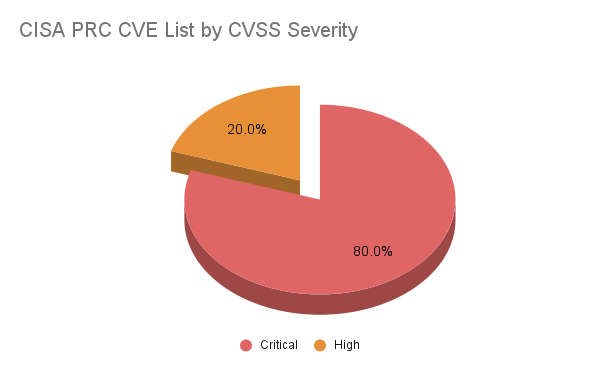Top 20 CVEs Exploited by People’s Republic of China State-Sponsored Actors (AA22-279A)
CISA, the NSA and FBI issue a joint advisory detailing the top 20 vulnerabilities exploited by state-sponsored threat actors linked to the People’s Republic of China.
Background
On October 6, the Cybersecurity and Infrastructure Security Agency (CISA) along with the National Security Agency (NSA) and Federal Bureau of Investigation (FBI) issued a joint cybersecurity advisory (CSA), identified as AA22-279A, outlining the top 20 CVEs exploited by the People’s Republic of China (PRC) state-sponsored threat actors since 2020. These vulnerabilities have been used to target a variety of U.S. and allied networks, including software and hardware companies with the explicit goal to “steal intellectual property and develop access into sensitive networks.” This advisory follows a similar advisory in October 2020, where the NSA published a list of 25 known vulnerabilities exploited by Chinese state-sponsored actors.
Analysis
The following 20 vulnerabilities were included in the joint CSA:
CVE
Description
CVSSv3
VPR*
CVE-2019-11510
Pulse Connect Secure Arbitrary File Disclosure Remote Code Execution (RCE) Vulnerability
10.0
10.0
CVE-2019-19781
Citrix ADC, Gateway and SD-WAN WANOP Path Traversal Vulnerability
9.8
9.2
CVE-2020-5902
F5 BIG-IP Traffic Management User Interface RCE Vulnerability
9.8
9.5
CVE-2021-1497
Cisco HyperFlex HX Command Injection Vulnerability
9.8
7.4
CVE-2021-20090
Buffalo WSR-32533DHPL2 Path Travesral Vulnerability
9.8
8.4
CVE-2021-22005
VMware vCenter Server File Upload Vulnerability
9.8
7.4
CVE-2021-22205
GitLab CE/EE RCE Vulnerability
10.0
10.0
CVE-2021-26084
Atlassian Confluence Webwork OGNL Vulnerability
9.8
9.7
CVE-2021-26855
Microsoft Exchange Server SSRF Vulnerability (“ProxyLogon”)
9.8
9.8
CVE-2021-26857
Microsoft Exchange Server Insecure Deserialization Vulnerability
7.8
7.4
CVE-2021-26858
Microsoft Exchange Server Arbitrary File Write Vulnerability
7.8
7.4
CVE-2021-27065
Microsoft Exchange Server Arbitrary File Write Vulnerability
7.8
9.8
CVE-2021-36260
Hikvision Web Server Command Injection Vulnerability
9.8
9.4
CVE-2021-40539
Zoho ManageEngine ADSelfService Plus Improper Authentication Vulnerability
9.8
7.4
CVE-2021-41773
Apache HTTP Server Path Traversal Vulnerability
7.5
6.7
CVE-2021-42237
Sitecore Insecure Deserialization Vulnerability
9.8
7.4
CVE-2021-44228
Apache Log4j2 RCE Vulnerability (“Log4Shell”)
10.0
10.0
CVE-2022-1388
F5 BIG-IP iControl REST Authentication Bypass Vulnerability
9.8
9.6
CVE-2022-24112
Apache APISIX Authentication Bypass by Spoofing Vulnerability
9.8
7.4
CVE-2022-26134
Atlassian Confluence Server and Data Center RCE Vulnerability
9.8
9.5
*Please note: Tenable’s Vulnerability Priority Rating (VPR) scores are calculated nightly. This blog post was published on October 7 and reflects VPR at that time.
Of the 20 vulnerabilities on the list, over 80% (16) of vulnerabilities were rated critical, while only 20% (four) of the vulnerabilities were rated high based on CVSSv3 scores.
Deja vu: Known vulnerabilities are valuable to threat actors
When reviewing the list of vulnerabilities included in the CSA, it’s hard not to notice the sheer volume of legacy vulnerabilities being leveraged by the PRC-sponsored threat actors. These flaws have been known for up to three years and have had patches available for some time. Yet, despite the availability of patches, threat actors find continued success in exploiting them. In fact, three of the vulnerabilities from the October 2020 NSA CSA were carried over into the latest CSA published on October 6, 2022:
CVE-2019-11510 – Pulse Connect Secure Arbitrary File Disclosure RCE
CVE-2019-19781 – Citrix ADC, Gateway and SD-WAN WANOP Path Traversal
CVE-2020-5902 – F5 BIG-IP Traffic Management User Interface RCE
Legacy flaws in VPNs still provide a door for attackers to enter
Included in the list of 20 CVEs are a pair of flaws in Secure Socket Layer Virtual Private Network solutions from Pulse Connect Secure (CVE-2019-11510) and Citrix (CVE-2019-19781). Both flaws have been exploited in the wild by a variety of attackers from ransomware affiliates to advanced persistent threat actors. We called out both of these flaws as part of our 2020 Threat Landscape Retrospective report along with a dedicated blog post in 2021 emphasizing the need for organizations to prioritize patching these flaws. They clearly remain some of the most valuable vulnerabilities in-use today.
Exchange Server is a prime target for PRC state-sponsored threat actors
ProxyLogon (CVE-2021-26855) and associated vulnerabilities (CVE-2021-26857, CVE-2021-26858, CVE-2021-27065) are included in this list. These vulnerabilities were disclosed in early 2021 after they were exploited in the wild by Chinese state-sponsored actors that Microsoft calls HAFNIUM. Later in 2021, the researcher responsible for ProxyLogon also disclosed three additional flaws in Microsoft Exchange Server dubbed ProxyShell, though the CSA did not explicitly call out these flaws. However, in September, two zero-day vulnerabilities in Microsoft Exchange Server, dubbed ProxyNotShell and disclosed by researchers at GTSC, were attributed to “a Chinese attack group.” The fact that Exchange Server continues to be targeted by Chinese threat actors is a reminder of the increasing importance of securing Microsoft Exchange Server.
Solution
All of the vulnerabilities referenced in the CSA have patches available for them. We strongly encourage customers to review the vendor advisories and apply the available patches as soon as possible to eliminate these known attack paths.
Identifying affected systems
A list of Tenable plugins to identify these vulnerabilities can be found here. This link uses a search filter to ensure that all matching plugin coverage will appear for the vulnerabilities referenced in this blog post.
Get more information
AA22-279A: CISA Top 20 CVEs Exploited by PRC State-Sponsored Actors
NSA CSA: Chinese State-Sponsored Actors Exploit Publicly Known Vulnerabilities
Join Tenable’s Security Response Team on the Tenable Community.
Learn more about Tenable, the first Cyber Exposure platform for holistic management of your modern attack surface.
Get a free 30-day trial of Tenable.io Vulnerability Management.
